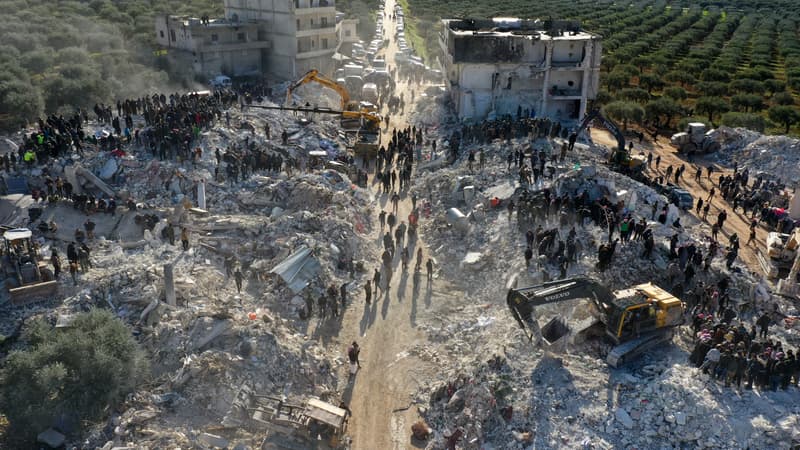In freezing cold, rescuers race against time Tuesday night to try to rescue survivors after the powerful earthquake, whose steadily worsening death toll now exceeds 7,800 dead in Turkey and Syria.
Twenty-three million people are “potentially exposed, including some five million vulnerable people,” the World Health Organization has warned. The WHO had previously said it feared “balances eight times higher than initial numbers”.
International aid begins to arrive this Tuesday in Turkey, where national mourning has been declared for seven days. The death toll there currently stands at 5,894. In Syria, 1,932 deaths have been recorded so far, a provisional total of 7,826.
“Hundreds of people are still trapped under the rubble”
Bad weather complicates the rescue task and makes the fate of the survivors even more bitter, shivering in tents or around makeshift braziers. Deeply bruised, Turkey’s hard-to-reach Kahramanmaras (southeast) region is buried under snow.
In Syria, the number of casualties is expected to “rise sharply as hundreds of people remain trapped under rubble,” according to the White Helmets (civil protection volunteers) in rebel areas.
In the government area, the province of Aleppo concentrates more than a quarter of the deaths, according to state media. The city, already devastated by the conflict, was hit hard with around 50 buildings collapsed and historical sites damaged, including the famous citadel.
“Who is not afraid? Everyone is afraid!”
In southern Turkey, firefighters were unable to extinguish a massive fire on Tuesday night caused by falling containers in the port of Iskenderun where a huge, potentially toxic cloud was rising into the sky.
The quake also hit the Bab al-Hawa border crossing, the only one through which almost all humanitarian aid sent from Turkey to rebel-held areas of Syria passes, according to the UN.
The Syrian Red Crescent, which operates in government areas, urged the EU to lift sanctions against Damascus and requested assistance from the United States Development Agency (USAID).
In Sanliurfa, Turkey, the authorities have opened dormitories for survivors in gyms, universities or mosques. But many residents preferred to sleep outside. “Who is not afraid? Everyone is afraid!” says Mustafa Koyuncu, 55, crammed with his wife and his five children into the family car.
Source: BFM TV


